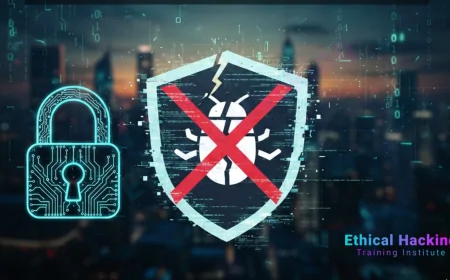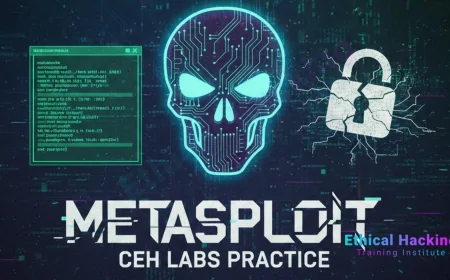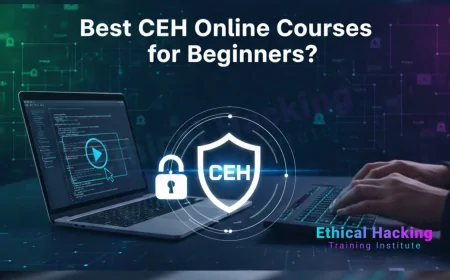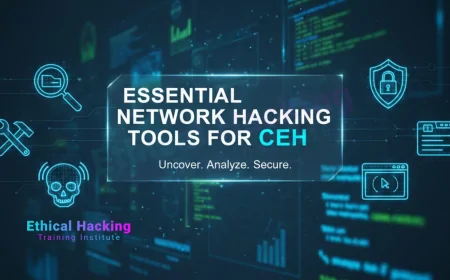CEH Program: Everything You Need to Know About the Ethical Hacking Certification Process | How to Get CEH Certified: Full Breakdown of the Ethical Hacking Certification Path
Explore everything about the CEH certification program — from eligibility, curriculum, labs, exam structure, costs, to how it boosts your cybersecurity career in 2025.
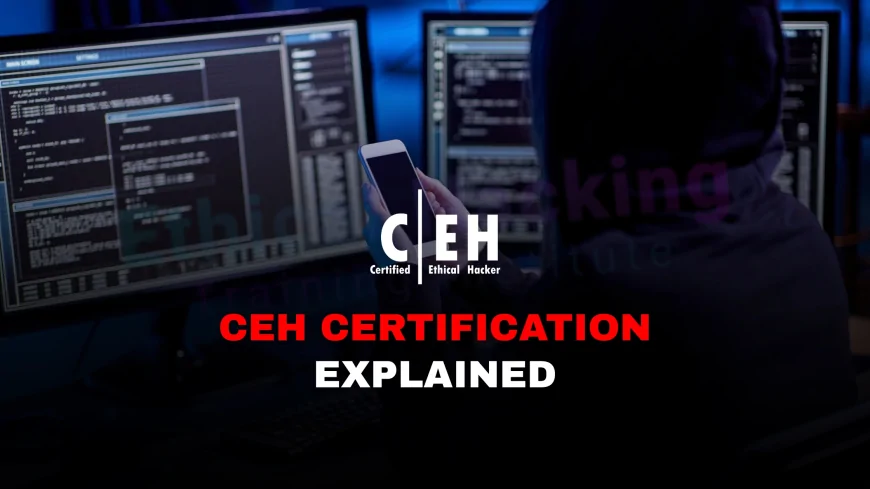
Table of Contents
- Introduction
- What Is the CEH Program?
- Why Pursue CEH?
- Eligibility & Prerequisites
- CEH v13 Curriculum
- Training & Learning Paths
- Hands‑On Labs & iLabs
- Exam Format & Structure
- Cost & Investment
- Study & Preparation Tips
- Certification Renewal
- Career Impact & Roles
- CEH vs Other Certs
- Best Practices
- FAQs
- Conclusion
Introduction
The EC-Council’s CEH program is internationally acknowledged as a leading certification in ethical hacking. It trains professionals to think like hackers—but ethically—to discover and fix security vulnerabilities before they’re exploited.Everything you need to successfully earn your CEH certification in 2025 is covered in this in-depth guide.
What Is the CEH Program?
The CEH program combines theoretical learning with intensive hands-on labs, covering attack strategies, security tools, and countermeasures. CEH v13 integrates new modules on AI-powered threats, cloud security, and IoT devices—all aligned with global security frameworks such as MITRE ATT&CK.
Why Pursue CEH?
- Industry-Recognized: ANSI-accredited and aligned with DoD/NICE.
- Holistic Skill Set: Covers both attack techniques and defense mechanisms.
- Career Opportunities: Opens roles like Pentester, SOC Analyst, Security Consultant.
- Competitive Salary: Certified professionals often earn 20–40% more.
- Global Mobility: Highly valued across banking, government, and enterprise sectors.
Eligibility & Prerequisites
You need either:
- Completion of CEH-authorized training OR
- Minimum 2 years of professional InfoSec experience and EC-Council approval.
CEH v13 Curriculum
- Introduction to Ethical Hacking
- Footprinting & Reconnaissance
- Scanning Networks
- Enumeration
- Vulnerability Analysis
- System Hacking
- Malware Threats
- Sniffing
- Social Engineering
- Denial-of-Service (DoS)
- Session Hijacking
- Evading IDS/Firewalls
- Hacking Web Servers & Apps
- SQL Injection, XSS, CSRF, XML Hacking
- Wireless, IoT, OT Attacks
- Cloud Security
- Cryptography
- AI-Powered Attacks
- Emerging Technologies & Frameworks
Training & Learning Paths
You can choose from these delivery modes:
- Live Instructor-Led** (official EC-Council or authorized partners)
- Self-Paced Online** (with video modules, labs, quizzes)
- Hybrid** (recorded content with scheduled mentor sessions)
Included in the training: virtual lab access, hands-on projects, and guidance from ethical hacking specialists. Self-study is possible with official guides and lab subscriptions from platforms like TryHackMe or HackTheBox.
Hands‑On Labs & iLabs
CEH’s iLab environment provides sandboxed labs replicating real-world attack scenarios across systems, applications, wireless networks, and cloud setups. Over 100 modules offer step-by-step guidance, tool configuration, exploitation, and mitigation exercises.
Exam Format & Structure
- CEH Theory Exam:** 125 multiple-choice questions in 4 hours; ~70% passing score
- CEH Practical Exam (Optional):** 6-hour, 20+ challenge-based tasks
The practical exam validates real-world skills and is highly respected by employers.
Cost & Investment
- Official training + iLabs + voucher: ₹70–100 k in India / $2–3 k globally
- Self-paced: ₹30–50 k / $500–1 k
- Exam retake: ₹20–30 k / $300–400
- Renewal every 3 years: CPE credits + fee ($80–100)
Study & Preparation Tips
- Build a home lab: Kali Linux, vulnerable VMs, network tools
- Use official CEH guide, practice questions, and video lectures
- Maintain a detailed lab journal with visual evidence and written observations
- Join community forums for peer support
- Take multiple timed mock tests
- Revise tool commands, real-world cases, and mitigation strategies
Certification Renewal
CEH requires renewal every 3 years through:
- Earn 120 Continuing Education Credits (CPEs)
- Monthly webinars, research writing, attending events
- Annual renewal fee: $80–100 or ₹5–8 k
Career Impact & Roles
- Entry-Level Roles:** SOC Analyst, Junior Pentester (₹4–8 LPA / $50–70k)
- Mid-Level:** Security Tester, Incident Responder (₹8–15 LPA / $70–100k)
- Senior & Leadership:** Red Team Lead, Security Architect (₹15–30 LPA+ / $100–150k+)
- Freelancing & Bug Bounty: High upside for skilled practitioners
CEH vs Other Certifications
| Certification | Focus | Hands-on | Cost | ROI Timeline |
|---|---|---|---|---|
| CEH | Wide-security spectrum | Medium | $2–3k | 6–12 months |
| PenTest+ | Pentest-focused | Medium | $1–1.5k | 6–9 months |
| OSCP | Deep pentesting | High | $3–5k | 1–2 years |
Best Practices
- Create a weekly schedule with defined goals
- Practice in labs before theory
- Engage with mentors and online communities
- Document experiments and tools used
- Stay updated with latest threat intelligence
Frequently Asked Questions (FAQs)
1. What is the CEH program?
An EC-Council certification teaching ethical hacking techniques and defense strategies.
2. Who is eligible?
Those with official training or 2 years InfoSec experience.
3. What is CEH v13?
The 2025 version with AI/security updates.
4. Is ongoing training necessary?
Yes—for earning CPEs and maintaining certification.
5. Do I need labs?
Absolutely—labs build real-world capabilities.
6. How long to prepare?
2–3 months full-time or 4–6 months part-time.
7. What is in the CEH Practical?
Hands-on exploitation, report writing, tool use under time pressure.
8. How do I renew?
Earn 120 CPEs + pay renewal fee.
9. Is CEH globally valid?
Yes—widely respected across sectors worldwide.
10. What's the exam format?
125 MCQs in 4 hours, optional 6‑hour practical test.
11. How are labs structured?
iLabs simulate real environments—network/web/cloud/IoT setups.
12. Can self-study work?
Yes, if you have disciplined schedule and lab access.
13. What tools are covered?
Nmap, Metasploit, Burp, Wireshark plus scripting.
14. Is CEH hands-on?
Yes—medium level practical complexity.
15. What jobs after CEH?
SOC Analyst, Pen Tester, Security Consultant.
16. How much does it take in India?
₹70–100 k for training and exam.
17. CEH vs OSCP?
CEH is broader, OSCP more advanced/hands‑on.
18. What is CPE?
Continuing education credits required to renew certification.
19. What if I fail?
Retake exam with vouchers; review weak modules.
20. What's my next step?
After CEH, pursue OSCP, CPENT, or specialty tracks like cloud security.
Conclusion
The CEH program offers a robust blend of offensive and defensive cybersecurity skills paired with recognized certification. With an organized preparation strategy—leveraging labs, communities, and mock exams—you can successfully earn the certification and launch a high-impact career. CEH remains one of the quintessential credentials for ethical hackers and security professionals in 2025.
What's Your Reaction?
 Like
0
Like
0
 Dislike
0
Dislike
0
 Love
0
Love
0
 Funny
0
Funny
0
 Angry
0
Angry
0
 Sad
0
Sad
0
 Wow
0
Wow
0
